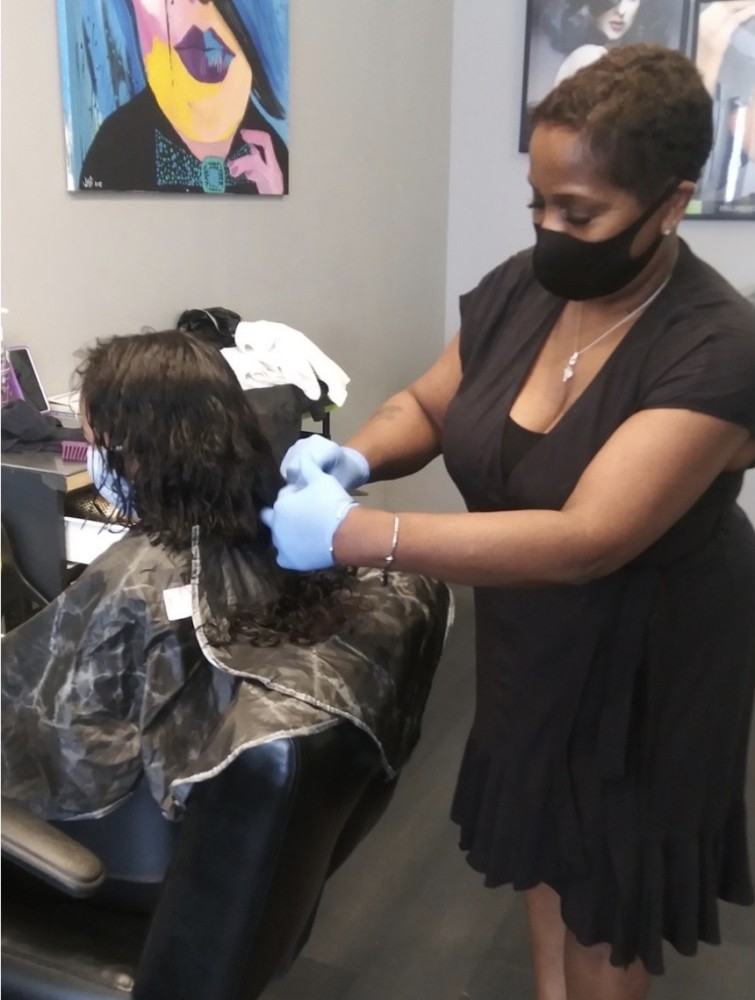By Peter Krouse
Advance Ohio Media, Cleveland
WWR Article Summary (tl;dr) As Peter Krause reports, a “University of California at Santa Cruz professor found that 41 percent of black-owned businesses and 32 percent of Latinx businesses in the United States went under from February to mid-April, when governments shut down businesses and issued stay-at-home orders. That compares to 22 percent for all businesses.”
Cleveland
Pecola Pointer owned the On Point Salon in downtown Cleveland for nine years — seven on St. Clair Avenue and the last two in the Halle Building on Euclid Avenue — before lack of business forced her to close in May.
That makes the 58-year-old African American stylist a statistic in what a recent study out of California has found to be the alarming demise of black-owned businesses during the coronavirus pandemic
A University of California at Santa Cruz professor found that 41 percent of black-owned businesses and 32 percent of Latinx businesses in the United States went under from February to mid-April, when governments shut down businesses and issued stay-at-home orders. That compares to 22 percent for all businesses.
A lot of minority business owners are also in industries hit hard by the economic disruption caused by the pandemic, including construction, restaurants, hotels and transportation, the report states.
Lamont Mackley, chief inclusion and outreach officer at Jumpstart Inc., which helps small businesses and entrepreneurs in Greater Cleveland, has witnessed the trend locally.
A big part of the problem, he said, is that minority-owned firms often have little in the way of reserves to carry them through difficult times.
“A lot of the businesses are surviving on revenue that they expect to get daily,” Mackley said. “So, you cut that off for even a week and they’re threatened.”
That was the case with Pointer. She used up what savings she had after she was forced to move two years ago.
“Some businesses have a nest egg or some businesses qualify for a loan,” Pointer said, “but I was not that one.”
The disproportionate impact on minority-owned businesses is also a reflection of the industries they choose.
“They tend to run businesses that are very important to the community but they are not forward-thinking businesses,” Mackley said, although some have managed to stay afloat by pivoting to a different business model.
Brian Hall, senior vice president at the Greater Cleveland Partnership and its executive director of equity and inclusion, called the stark numbers disappointing.
“I think what I really felt was hurt,” Hall said. “It’s like a blow to the stomach.”
Hall said he doesn’t know the number of minority-owned businesses in Cleveland that have gone under during the pandemic, but that without the support some have been able to receive the “numbers would absolutely be worse.”
Several local organizations have provided financial assistance, including Cuyahoga County’s Small Business Stabilization Fund. It’s goal has been to help those businesses healthy enough to survive, “not just live another month.” Hall said.
The Business Growth Collaborative, led by Jumpstart and using money provided by KeyBank, has doled out small grants to minority-owned businesses needing help. And Cleveland Development Advisors, a division of the Greater Cleveland Partnership, gave $100,000 to three community development corporations in the city so they could help businesses in need.
A number of small businesses have also been able to secure $10,000 loans from the City of Cleveland’s Emergency Working Capital Fund.
Tim Muhammad could use some of that assistance after being turned down for a Small Business Administration loan.
The 48-year-old minority entrepreneur bakes bean pies and sells them out of a storefront near East 118th Street and Buckeye Road. But the coronavirus and stay-at-home orders have driven away many of his customers, and he is barely hanging on.
“I’m behind on my lights, my gas, my rent, everything right now,” said Settles, who calls his store The Bean Shop. ” I don’t even know If I’m going to be able to stay in here next month.”
Cleveland Councilman Blaine Griffin said he wants to help Settles, including finding him a new location.
Meanwhile, Pointer is styling hair again, but not at her own salon. She and the barber and part-time stylist that shared her storefront in the Halle Building are now at the Christopher Amira Studio and Academy on Larchmere Road.
Rebuilding her customer base is taking time, she said, because the coronavirus is still a concern. But she is hopeful, and thankful for the outpouring of support she’s received from her two grown children, her fiancée and her church.
“I’m just so blessed you don’t even know,” she said.
___
Distributed by Tribune Content Agency, LLC.














































































































































































































































































































































































